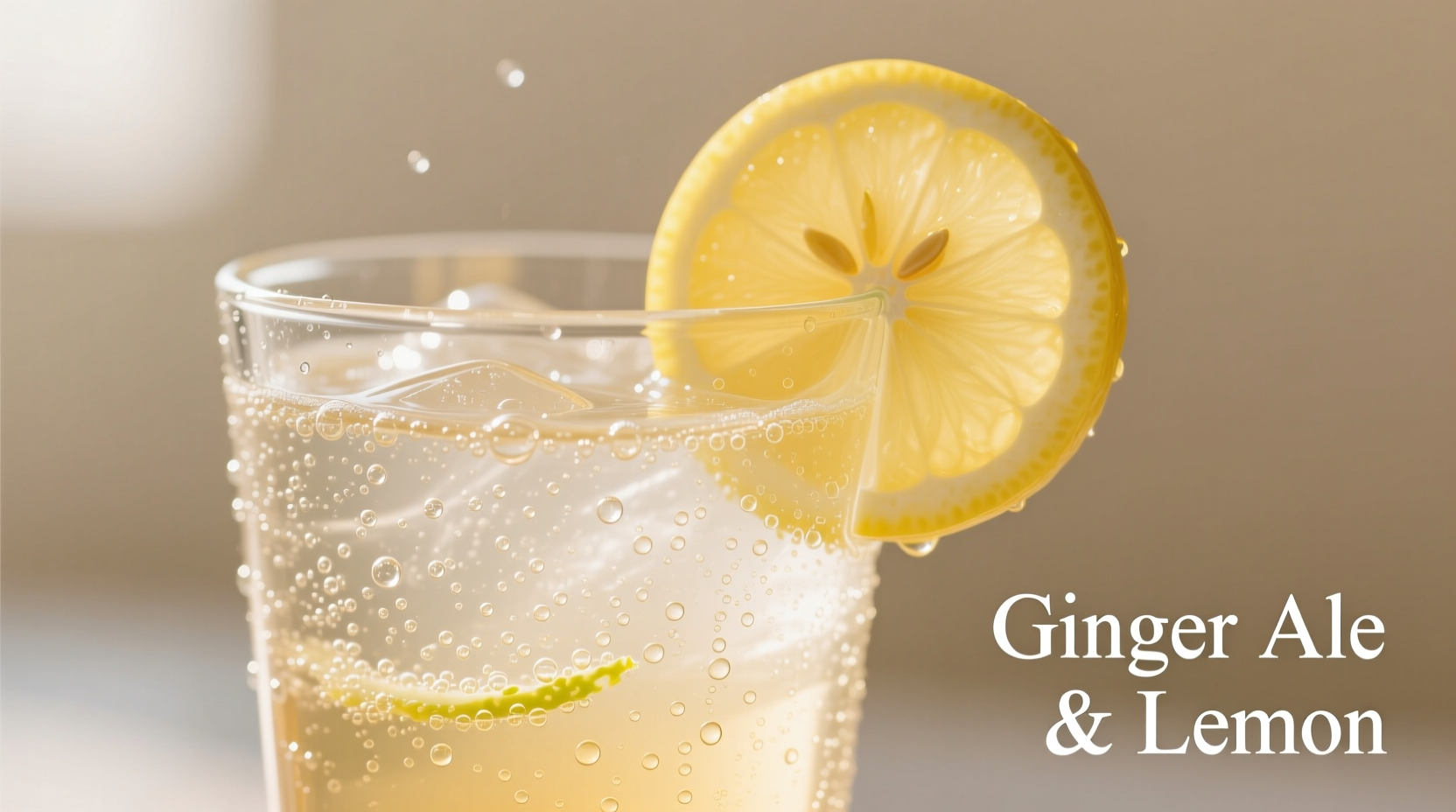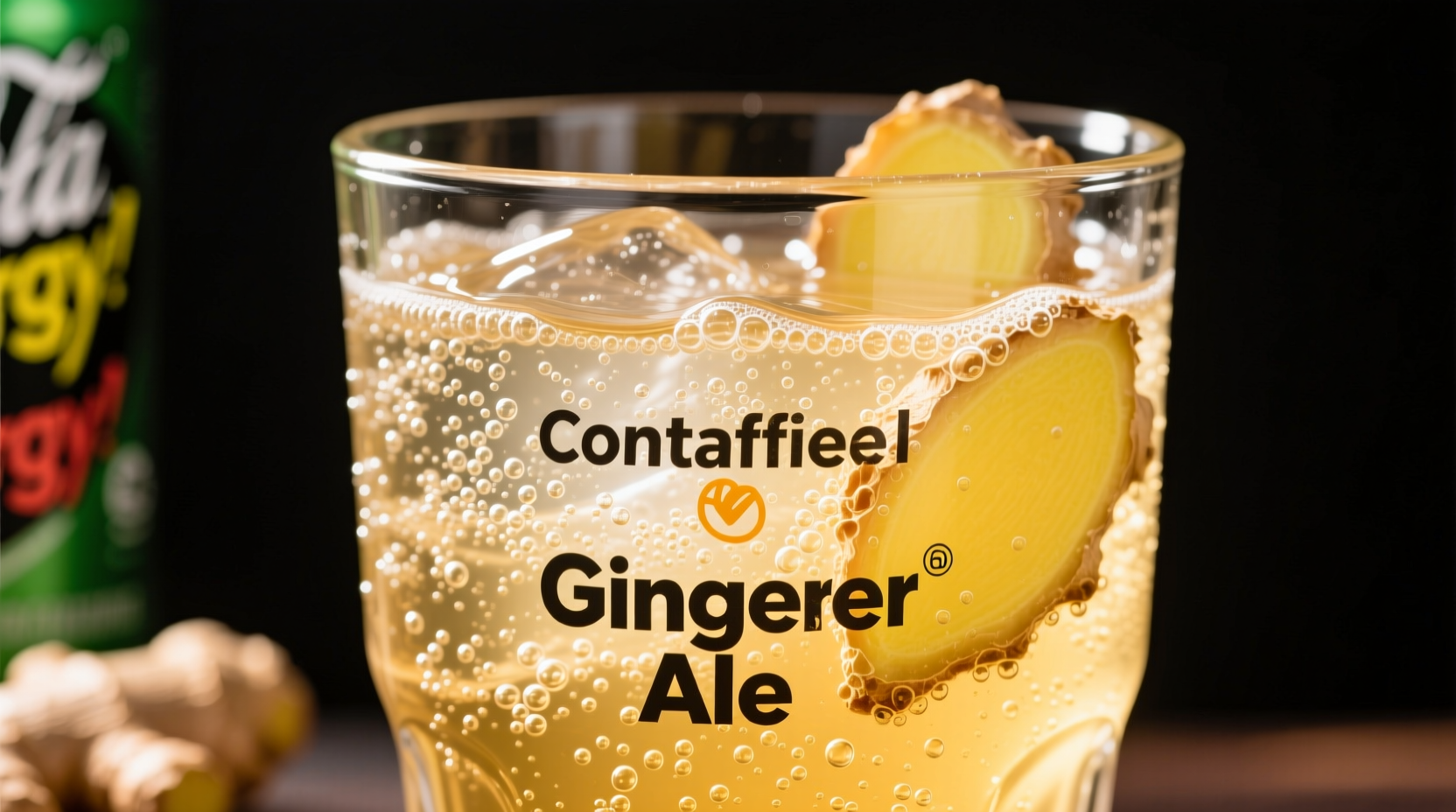If you're monitoring your caffeine intake for health reasons, sleep quality, or personal preference, you'll be relieved to know that traditional ginger ale is naturally caffeine-free. This makes it an excellent choice for evening refreshment, children's beverages, or as a mixer in non-alcoholic drinks when you want to avoid stimulants.
Understanding Ginger Ale Composition
Ginger ale has been a popular soft drink since its creation in 19th century Ireland. Unlike cola beverages which traditionally contain caffeine from kola nuts or added sources, ginger ale's primary flavor comes from ginger root. The standard formulation across major brands includes:
- Carbonated water
- High fructose corn syrup or sugar
- Ginger root extract
- Citric acid
- Natural flavors
- Sodium benzoate (preservative)
None of these standard ingredients contain caffeine, making ginger ale fundamentally different from many other carbonated soft drinks. The confusion often arises because some people assume all "sodas" contain caffeine, but this isn't accurate—especially for ginger-based beverages.
Ginger Ale Brand Comparison: Caffeine Content Verified
| Brand | Regular Version | Diet Version | Specialty Varieties |
|---|---|---|---|
| Canada Dry | No caffeine | No caffeine | No caffeine (except Energy line) |
| Schweppes | No caffeine | No caffeine | No caffeine |
| Seagram's | No caffeine | No caffeine | No caffeine |
| Fever-Tree | No caffeine | No caffeine | No caffeine |
| Reed's | No caffeine | No caffeine | No caffeine (except Ginger Beer Extra) |
Source: Official ingredient listings from brand websites and FDA-compliant nutrition labels (2023-2024). Canada Dry's Energy line is the notable exception among mainstream brands, containing 71mg of caffeine per 16 fl oz bottle.
Why Some People Mistakenly Think Ginger Ale Contains Caffeine
The confusion about ginger ale and caffeine typically stems from three common misconceptions:
- Association with other soft drinks - Many popular carbonated beverages like colas and some lemon-lime sodas contain caffeine, leading people to assume all sodas do
- Confusion with ginger beer - Some craft ginger beers use fermentation processes that might incorporate caffeine-containing ingredients
- Misunderstanding of "natural flavors" - Consumers sometimes worry this vague term might hide caffeine sources
According to the U.S. Food and Drug Administration, any added caffeine must be explicitly listed in the ingredients when present in significant amounts, providing transparency for consumers.
When Ginger Ale Might Contain Caffeine
While traditional ginger ale is caffeine-free, certain specialty products may include caffeine:
- Energy-enhanced varieties - Canada Dry recently introduced an "Energy" line containing caffeine
- Craft or small-batch formulations - Some artisanal producers might blend ginger with guarana or green tea extracts
- International variations - Certain Asian-market ginger drinks may combine ginger with caffeine-containing botanicals
- "Functional" beverage blends - Products marketed for digestive health might combine ginger with yerba mate
For those particularly sensitive to caffeine or avoiding it completely, always check the ingredient list for terms like "caffeine," "guarana," "yerba mate," or "green tea extract" which would indicate caffeine presence.
Reading Labels: What to Look For
When verifying if a specific ginger ale contains caffeine, examine both the nutrition facts panel and ingredients list:
- Check the "Contains" statement below the ingredients for allergens (caffeine isn't required here but some brands list it)
- Scan the ingredients list for explicit mentions of "caffeine"
- Look for potential caffeine sources like "guarana," "yerba mate," or "green tea extract"
- Review any "functional" claims like "energy support" or "alertness" which might indicate caffeine
The USDA FoodData Central database confirms that standard ginger ale contains zero milligrams of caffeine per serving, while specialty varieties will list caffeine content when present.
Ginger Ale vs. Ginger Beer: Understanding the Difference
Many consumers confuse ginger ale with ginger beer, which can affect caffeine assumptions:
- Ginger ale - Commercially produced, carbonated soft drink with mild ginger flavor, typically non-fermented
- Ginger beer - Traditionally fermented beverage with stronger ginger flavor; some craft versions may contain trace alcohol
While traditional ginger beer is also caffeine-free, some modern craft versions blend ginger with tea or other botanicals that might contain caffeine. Always verify specific product formulations if avoiding caffeine.
Practical Guidance for Caffeine-Conscious Consumers
For those managing caffeine intake, ginger ale offers several advantages:
- Evening beverage option - Enjoy as a nighttime refreshment without sleep disruption
- Children's alternative - Safer than colas for kids sensitive to caffeine
- Pregnancy consideration - Recommended over caffeinated sodas during pregnancy
- Mixology applications - Ideal non-caffeinated mixer for mocktails and certain cocktails
Registered dietitians often recommend ginger ale as part of hydration strategies for those reducing caffeine consumption, as noted in the Academy of Nutrition and Dietetics resources on beverage choices.

Homemade Ginger Ale: Complete Control Over Ingredients
If you want absolute certainty about caffeine content, making ginger ale at home gives you complete control. A basic recipe requires only:
- Fresh ginger root
- Sugar or honey
- Lemon or lime
- Water
- Yeast (for fermentation, optional)
This traditional method produces a naturally carbonated beverage with no possibility of caffeine unless you intentionally add it. Food safety expert Dr. Catherine Strohbehn notes that home preparation eliminates concerns about hidden ingredients found in some commercial products.
Final Verification: How to Confirm Caffeine Content
When in doubt about a specific ginger ale product, use these verification methods:
- Check the manufacturer's official website nutrition information
- Contact customer service directly with your question
- Use third-party nutrition databases like MyFitnessPal or Cronometer
- Look for caffeine testing strips if you have extreme sensitivity
For medical purposes or severe caffeine sensitivity, consulting with a registered dietitian can provide personalized guidance about beverage choices that meet your specific health requirements.











 浙公网安备
33010002000092号
浙公网安备
33010002000092号 浙B2-20120091-4
浙B2-20120091-4